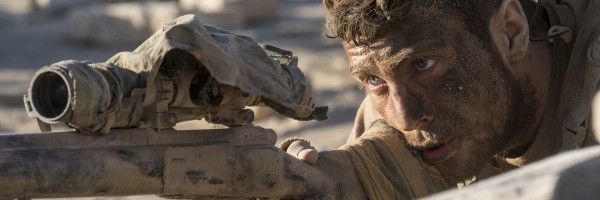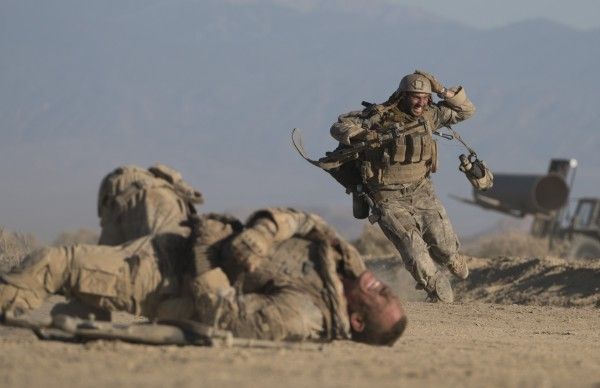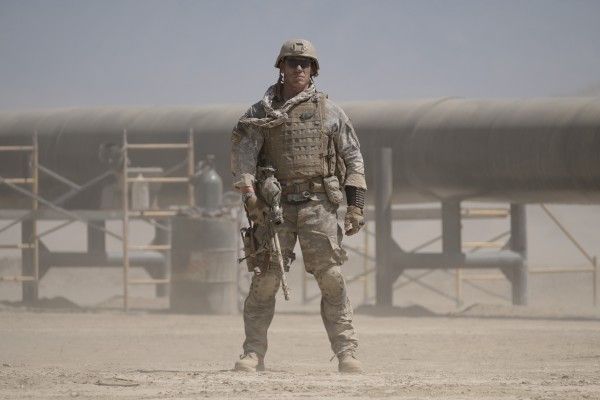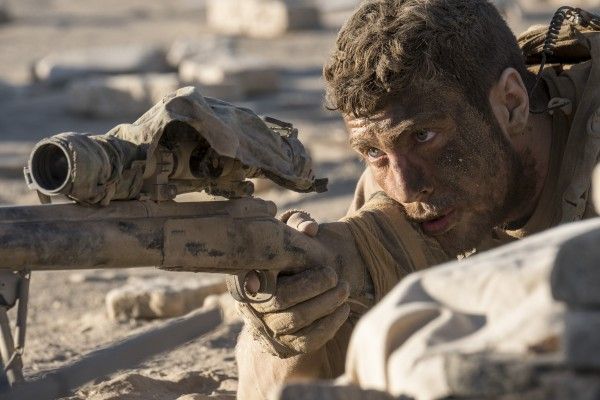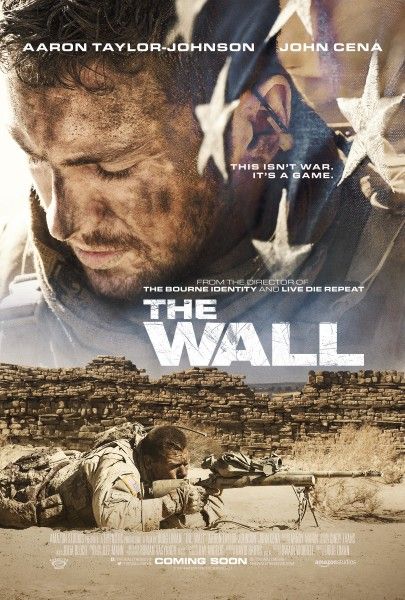From director Doug Liman, the psychological thriller The Wall is a deadly game of cat-and-mouse that follows two soldiers (played with expert skill by Aaron Taylor-Johnson and WWE superstar John Cena) who are pinned down by an Iraqi sniper. Their fight becomes a battle of will and wit, and as they learn more about each other, all that stands between them is a crumbling wall that can only last so long.
At the film’s press day, Collider sat down with actor Aaron Taylor-Johnson for this 1-on-1 interview about how physical and psychological this shoot was, the extensive research and training that he did, the intense 14-day shooting schedule, having the wall itself play such a big role in the story, and the experience of having John Cena as a co-star. He also talked about taking a bit of a break from acting, so that he can work on writing something with his wife, Sam Taylor-Johnson, why he’d like to work with her again, and why he’d like to get more involved in the projects that he signs on for.
Collider: When you signed on for this, did you know that it would be such a huge undertaking, as far as how much you’d be doing?
AARON TAYLOR-JOHNSON: Yeah, absolutely! It was everything I had hoped it to be, and more. When you read the script, you could see, on the page, how physical this would be, but also how psychological it all is. The concept of it, the budget, and what we were going to try to achieve and accomplish was definitely a huge challenge, but knowing that it was going to be Doug Liman was the real go-ahead for me. That was the exciting thing, to be able to be puppeteered through the whole journey, by him and with his vision. I felt secure and safe in his hands.
It seems like, in order to properly play a character like this, there are multiple different layers to get a handle on, whether it’s the physicality, the mentality of it all, or the skill that’s required. Where did you start with all of that, and when did you become secure with it?
TAYLOR-JOHNSON: We didn’t really know if he was a sniper, a Marine, or a soldier, so I first got in touch with a Marine, Jacob Schick, who’s a third generation Marine and a war vet. He’s a part of the 22 Kill Foundation, which is named after the fact that 22 veterans a day commit suicide. He’s remarkable. I went to Boston and spent some time with him and the guys, and we got out on the shooting range. I came across this amazing woman, serendipitously, who’s a gold star wife, which means she lost her husband in action, and he was a sniper. I sat down with her and talked to her a lot, and she was very helpful in giving me a lot of information on him and in giving me photos. I used a lot of referencing for my character from him. My character’s costume and look is based off of those photos. We had Nick Irving, “The Reaper,” consulting. He was there, every day, and he’s incredible. And I spent four days in the top sniper school in the country, which is in Arkansas. I was on the base with those guys there, while they were learning their course. We talked ballistics and mathematics, and we shot rifles, up to a mile out. I picked up mannerisms, bad habits, humor and banter, and tried to apply that to the character. That was about two months of research, but it always should be that way.
Do you feel like having only a 14-day shooting schedule really helped the level of intensity that this required?
TAYLOR-JOHNSON: I think you’re right. It built into the intensity and the intention of the film. There was that pressure. I wouldn’t want to spend three months doing that shoot, up against the same wall, but we did it, in and out.
The wall itself is really its own character in this, and you have to interact and work with it quite a bit. How was it to have something like that?
TAYLOR-JOHNSON: Any film that can identify with the environment becoming a character is really beautiful. The weather, too, plays a huge part in it, with the sandstorms and the heat. That’s it own character, as well. It definitely felt like the wall has its own journey and, in the end, my character is able to knock it down. There’s definitely a metaphor in there. He had his boundaries up and he couldn’t confront his own inner fears, until he was able to look at himself and say that it’s fine. By that point, he was able to expose himself, both with the wall and within himself. So yeah, it does play a character. It’s a huge metaphor, throughout the movie, if you’re a film student who wants to analyze every little bit.
What was it like to have John Cena, as your co-star?
TAYLOR-JOHNSON: He’s incredible. I don’t think anybody can prepare for the expectation of what you think John would be like, but he’s a remarkable person. He’s very funny and he’s very smart. He’s intellectual and he’s business-minded. He’s very professional. He turns up hugely prepared, very gracious and very grateful. I had a great time with him. He’s a really nice dude.
Do you have any idea what you’re going to be doing next?
TAYLOR-JOHNSON: I do, but it’s nothing I can really talk about. My wife (Sam Taylor-Johnson) and I are writing something, and that’s my, or our, main goal. I always like to work well out of my comfort zone and out of my league, and I like to always be challenged. Right now, I’ve not shot anything since we did [The Wall] last year, and you probably won’t see me doing anything for about another year.
You worked with your wife on Nowhere Boy before you were married, and you haven’t worked together since then. Have you been looking for something?
TAYLOR-JOHNSON: Yeah, and we’ve always wanted to. It’s tough to find the right project, and we’ve found it, so we’re trying to make it work and make it happen. That’s the most interesting thing to do. Sometimes you’re just an actor for hire, and you’re in and out, but you’re not part of the process. [The Wall] was very collaborative. It was a very small family affair that was very intimate and low-budget. I was there pretty much from the get-go, through all of the drafts of scripts. I was very influential on some of the stuff because of all of the research that I did. And I’ve seen the transition through the editing process, with what Doug’s done. It’s intriguing to me. I love to see filmmakers in their element, and I love to be a part of the filmmaking process. I love seeing what my wife does, whether it’s Fifty Shades of Grey, or the latest thing she’s got for Netflix (Gypsy), with Naomi Watts. She’s extremely talented, so I want to work with her. I just can’t say on what yet.
Have you thought about starting a production company or getting into directing, yourself?
TAYLOR-JOHNSON: This would be under our production company, yeah. That would be the idea. We’ll see. It’s more interesting. Working with someone like Tom Ford (on Nocturnal Animals), he’s someone who’s remarkable, but hugely inspiring. He comes to work fully prepared and with high expectations. He’s a perfectionist. And seeing Doug Liman adapt to what the script for The Wall was. It was beautifully written, but it was like a very long endless scene, from start to finish. It was like a play. It was remarkable, but Doug restructured it into a three-act cinematic structure. So, I’ve seen the mechanisms, and the technical and practical side of how things are broken down and done. It’s not about being able to do it. You can always find the right people. You can get great writers to polish, producers who are collaborative, a great production designer and line producer, and it’s a collaborative process. It’s the confidence that they have. It’s the fact that they just do it. My wife can direct. She’s capable of all of those things. She’s an artist and she has no fear of that. She just improvises with the environment around her. I can’t do that. I need preparation.
The Wall is out in theaters on May 12th.

